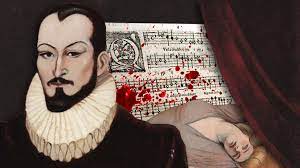Carlo Gesualdo, Prince of Venosa (1566–1613), was not only a composer but also a nobleman, infamous for his tumultuous life and revolutionary music. Here are ten intriguing facts about this enigmatic figure:
- Noble Origins: Carlo Gesualdo was born into one of the wealthiest and most powerful families in Italy. His title, Prince of Venosa, was inherited from his father, who ruled the small principality of Venosa.
- Musical Prodigy: Gesualdo showed an early aptitude for music and was educated in the arts, languages, and music theory. He began composing music in his teens and was particularly drawn to the avant-garde style of the late Renaissance.
- Innovative Harmonies: Gesualdo’s compositions are renowned for their daring harmonies and expressive dissonances, which were highly unusual for the time. He pushed the boundaries of traditional music, foreshadowing the harmonic experiments of later composers like Schoenberg and Stravinsky.
- Madrigal Maestro: Gesualdo is best known for his madrigals, a form of secular vocal music popular in the Renaissance. His madrigals are characterized by their intense emotional content, complex polyphony, and chromatic harmonies.
- Dark Reputation: Despite his musical talent, Gesualdo is perhaps equally famous for the scandalous events of his personal life. He gained infamy for the brutal murder of his wife and her lover in 1590, allegedly catching them in flagrante delicto.
- Haunted by Guilt: Following the murders, Gesualdo was plagued by guilt and remorse. Some historians suggest that his later compositions reflect his psychological turmoil, with themes of suffering, redemption, and spiritual anguish pervading his work.
- Isolated Existence: After the scandal, Gesualdo retreated to his castle in Gesualdo, where he lived in seclusion for much of his life. He became increasingly reclusive and devoted himself entirely to music and religious contemplation.
- Religious Conversion: In the later years of his life, Gesualdo underwent a profound religious conversion. He became deeply devout and composed numerous sacred works, including motets and sacred madrigals, reflecting his spiritual introspection.
- Influence and Legacy: Despite his relatively small output compared to his contemporaries, Gesualdo’s music had a significant impact on later composers. His harmonic innovations and emotional intensity foreshadowed the development of Baroque music and even anticipate aspects of the Romantic era.
- Modern Resurgence: Gesualdo’s music experienced a revival in the 20th century, with composers and scholars rediscovering his works and reassessing his contributions to music history. His compositions continue to fascinate performers and listeners alike, offering a window into the turbulent psyche of a truly unique musical genius.
Carlo Gesualdo’s life and music remain a fascinating subject of study, offering insights into the complexities of art, passion, and human nature.


Comments are closed